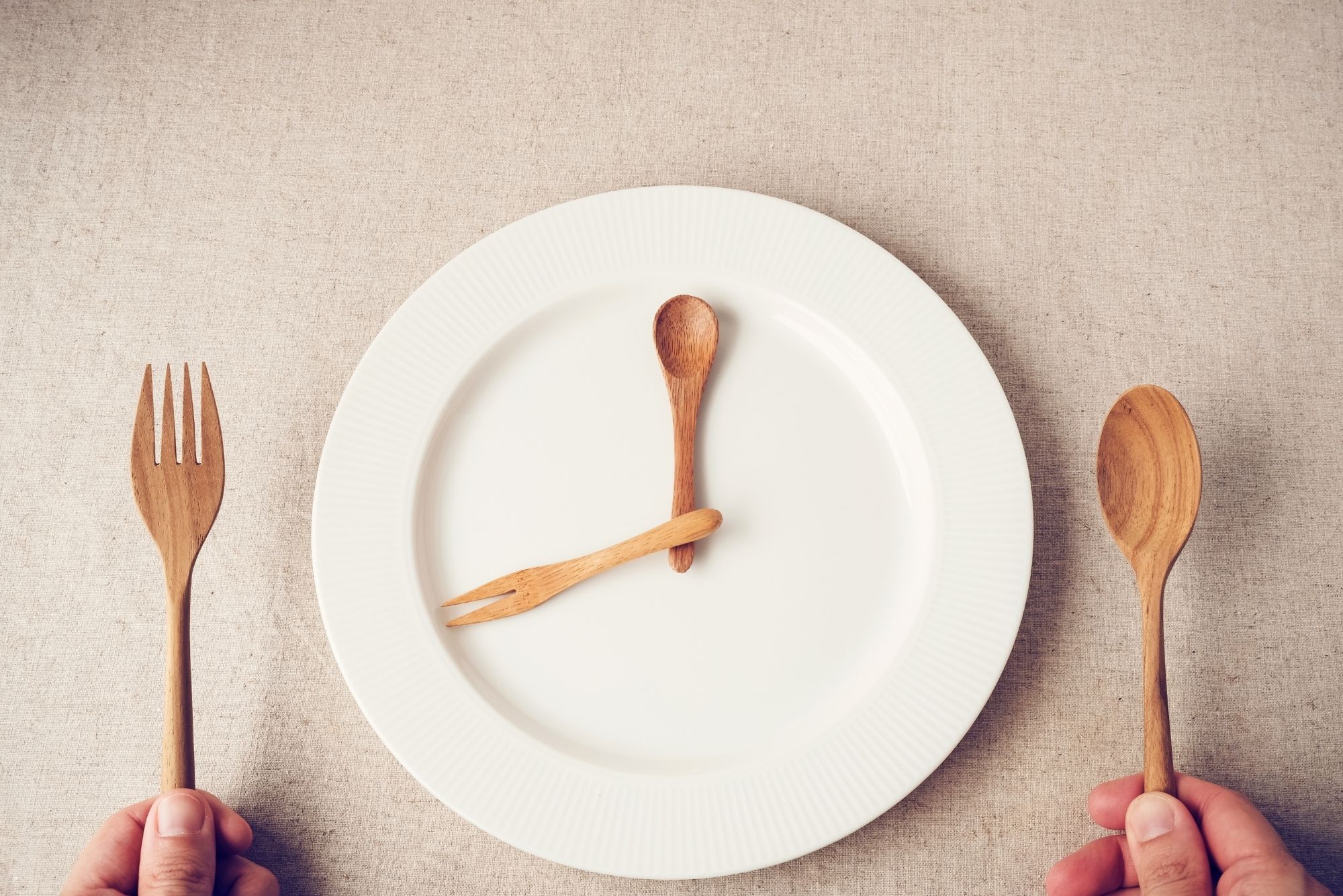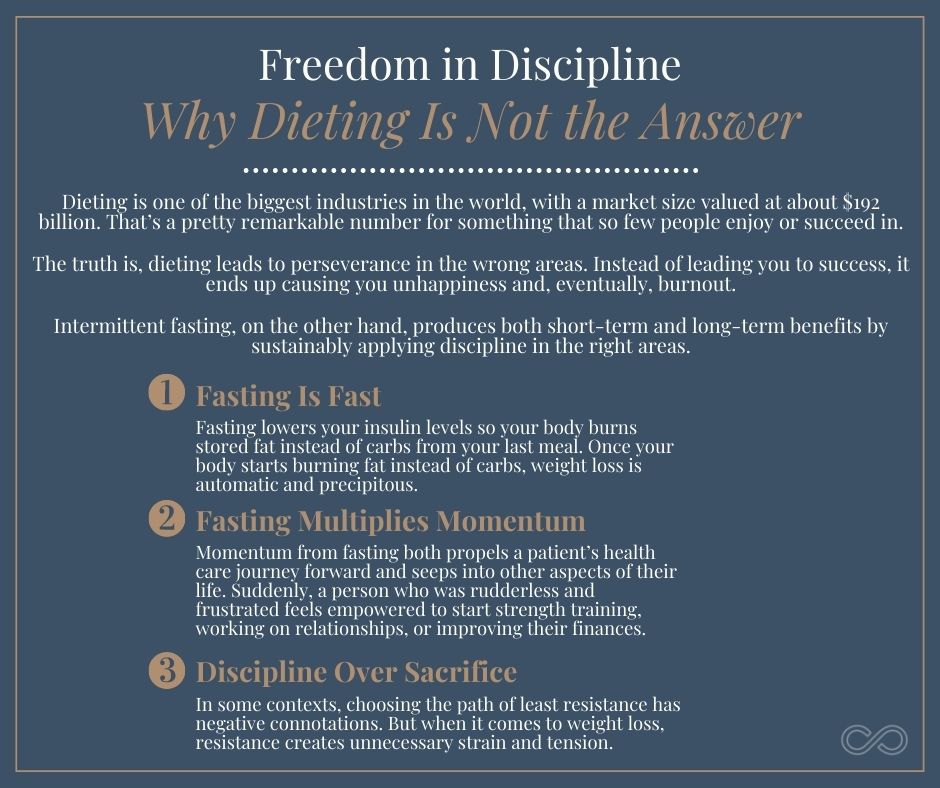Download file | Play in new window | Duration: 00:25:53 | Recorded on February 24th, 2022
Dieting is one of the biggest industries in the world, with a market size valued at about $192 billion. That’s a pretty remarkable number for something that so few people enjoy or succeed in.
Dieting remains popular because weight loss is viewed as a major indicator of health — both physically and in terms of self-esteem. So even though the vast majority of dieters don’t succeed, they keep trying, failing, and trying again.
It’s true that we value perseverance and determination as positive attributes. But there’s that popular saying about doing the same thing over and over and expecting different results.
The truth is, dieting leads to perseverance in the wrong areas. Instead of leading you to success, it ends up causing you unhappiness and, eventually, burnout.
I’ve posted in the past about why goal-setting doesn’t really work and why alternative approaches using the power of momentum are more effective. It’s time to apply this principle to weight loss.
For this month’s podcast, the always-brilliant Jen Justus joined me to discuss weight loss and why dieting is not the answer. Among other things, we agreed that weight loss is usually temporary when achieved through dieting.
Intermittent fasting, on the other hand, produces both short-term and long-term benefits by sustainably applying discipline in the right areas.
In this post, I’ll share some of our epiphanies in breaking down why dieting is ineffective and how fasting is an easier, more sustainable model that not only works better for weight loss but also creates momentum and freedom in your life.
Freedom Comes From Discipline, Not Sacrifice
“Diet” is one of those four-letter words that provokes a sense of dread in most people. There are hundreds of diets, but they almost all have the same con in common: they are slow, difficult, and rooted in sacrifice.
What’s worse, diets are ineffective and unsustainable.
People can become almost religiously dogmatic about their diet for a certain period of time and then, almost inevitably, fall off the wagon and resume the same behaviors and patterns that caused the problem in the first place. This cycle can go on for years, creating a sense of perpetual struggle and failure.
Diets are ineffective for the same reason people dread them: they are fundamentally rooted in sacrifice, in depriving yourself of something you enjoy.
Dieting is a negative process that enslaves people to tactics that bring suffering. This kind of sacrifice isn’t really discipline; it’s simply a war of attrition with yourself.
Alternatively, fasting affords a sense of control and flexibility. Instead of tactics of sacrifice and deprivation, fasting is an exercise in mental discipline. And instead of suffering, it generates freedom.
Let’s take a look at the reasons why fasting is so easy, fast, and effective — and how that maps to greater freedom and momentum in your life.
Fasting Is Fast, and Easy To Implement
Patients new to fasting often express shock at how quickly and effectively it works. There’s a scientific basis to this, grounded in biochemistry and physiology, that may surprise you.
I won’t get too far down into the weeds because I’ve covered the science of fasting before (here and here), but it’s instructive to understand the simplicity behind how fasting actually affects weight loss.
It has to do with metabolic processes and the way your body converts food into energy.
Johns Hopkins neuroscientist Mark Mattson, Ph.D., who has studied intermittent fasting for 25 years, says the idea that we must eat every few hours, or even every day, is a myth. Prehistoric hunters and gatherers, who didn’t have the luxury of farming, often went days without eating.
So evolution endowed us with the natural ability to fast. And as it turns out, fasting triggers in the body a natural process that Mattson calls metabolic switching. This is when your body burns through its supply of refined carbohydrates, like sugar and grains, and begins to convert energy elsewhere — i.e., your fat reserves.
There’s a bit more to it than this, but the basic principle is lowering your insulin levels so that your body burns stored fat instead of carbs from your last meal.
After about 8 hours of sleep, your body is just beginning to enter a phase of metabolic switching – and that’s right when most people immediately chow down on what has traditionally been called the “most important meal of the day.”
But if you can hold off for another 8 hours (or more, or less — there’s a lot of variation and flexibility) and sustain that for just a few weeks, you will see results. Once your body starts burning fat instead of carbs, weight loss is automatic and precipitous.
Such rapid results provide a sense of progress and momentum, that surge of motivation you get when you find out something works for you and is reproducible. This “stick-to-it-ness” factor helps create the short-term and long-term wins that multiply momentum in other aspects of your health and life.
Cut Stress and Decision Fatigue
Fasting also brings with it a marvelously easy implementation. There’s really only one decision involved: don’t eat breakfast. And it’s in the morning before the day can overwhelm you with decision fatigue.
Conversely, look at the sheer number of decisions necessary when dieting. You’re making intricate, sacrificial meal decisions three times a day, plus decisions for snacks, grocery planning, and food preparation. Then once the diet’s over, you have to create and follow a plan to keep the weight off.
The pressure on people to be perfectly in line with their diet’s dogmatic regimen is highly stressful. Combined with all the other decisions and worries throughout the day, this can be overwhelming.
Dieting focuses on what you eat, while fasting focuses on when you eat. And it simplifies that, too.
By switching from dieting to fasting, you eliminate at least 50% of your decision-making right from the start of your day.
Reject Counting and Diet Dogma
You also remove the strain of dieting’s primary tactic, which is counting. This is part of the dogmatic nature of dieting that wears people down over time: counting calories — or carbs, fats, sugars, etc. — for every meal and snack. Is anyone particularly ecstatic about this endless chore?
With fasting, all of that is thrown out. While it’s obviously still important to be mindful of consuming nutritious foods, you don’t have to think about your meals for large chunks of the day. And when it’s time to eat, you don’t have to grab your phone to count up the number of calories or confer with medical charts or lists. You just sit down and eat what you enjoy.
Fasting has significantly fewer points of failure and requires less mental bandwidth to sustain. It’s a net simplifier that increases your freedom.
Fasting Includes Offense and Defense
Not only is dieting rooted in the tactic of sacrifice, but it also focuses completely on offense — on losing weight. It has no defensive strategy. Dieting either asks participants to sacrifice forever (an unsustainable option at best), or gives them no tools to maintain what success they’ve achieved.
Jen and I discussed how we’ve both had patients who’ve lost 100 pounds multiple times in their lives. Now, this is a great accomplishment, no doubt. But the problem is that the vast majority of dieters put that weight right back on when their diets end. So they have to start the diet again or adopt a new one.
Besides the struggling and suffering involved in this cycle, the bigger problem is that it’s not sustainable. As we get older, our hormonal balances shift and our bodies have to contend with a variety of conditions like arthritis, sleep apnea, and others. It becomes much harder to pull off a feat like losing 100 pounds.
Fasting, however, comes with both offense and defense baked in.
On the offensive side, you consistently shed 5, 10, 20+ pounds in a sustainable trajectory, without sacrifice. And for defense, you simply continue the sustainable, disciplined lifestyle you’ve already adopted.
Fasting Multiplies Momentum
Fasting also works as a momentum multiplier in your life.
From the many patients who’ve exclaimed over the ease of fasting, I hear another common refrain: they feel a new sense of agency and freedom. Fasting seems to break a kind of inertia in their lives. Instead of spinning their wheels with no control, patients begin to rack up a string of small wins.
Because they notice progress so quickly and consistently, that positive momentum becomes exponential.
Momentum from fasting both propels a patient’s health care journey forward and seeps into other aspects of their life. Suddenly, a person who was rudderless and frustrated feels empowered to start strength training, working on relationships, or improving their finances.
A person noticing the rapid progress from fasting thinks I feel bold, I feel brave, I feel courageous. I’m going to harness that tailwind and ride it to even greater rewards.
Choose Discipline Over Sacrifice
In some contexts, choosing the path of least resistance has negative connotations. But when it comes to weight loss, resistance creates unnecessary strain and tension.
Dieting produces an ongoing internal struggle as you sacrifice things you love.
The dieter labors each moment of each day over every meal and snack. Am I eating the right foods? How many calories does this have? Am I strong enough to resist temptation? Will I make it through the birthday party on Friday? Will I make it through the barbecue this weekend?
What if you weren’t haunted by these thoughts? What if your inner voice wasn’t constantly hounding you and diverting your attention?
Audit yourself for these feelings and ask yourself if they’re helping you. There’s a better way to achieve weight loss.
Discipline will produce sustainable freedom, not suffering, in your life.

Dr. Aaron Wenzel is a concierge physician specializing in the care of fast-moving entrepreneurs, executives, and public figures in the Nashville, TN area. Dr. Wenzel’s diverse life experience and extensive training in family medicine, emergency care, nutrition, and hormone replacement therapies give him the unique platform to provide unmatched care for his patients.







